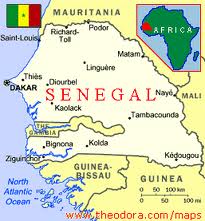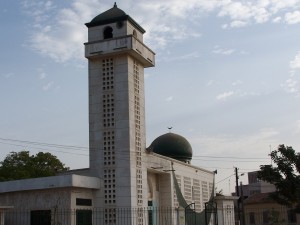 At the most western point of Africa you can find Dakar, also called the capital of West-Africa. This city is almost completely surrounded by the sea and inhabits around 2,5 million Senegalese people. The city is alive and flourishes, but it may look chaotic to someone from outside. However, culturally, academically and politically Dakar is the place to be.
At the most western point of Africa you can find Dakar, also called the capital of West-Africa. This city is almost completely surrounded by the sea and inhabits around 2,5 million Senegalese people. The city is alive and flourishes, but it may look chaotic to someone from outside. However, culturally, academically and politically Dakar is the place to be.
Senegal is a crossing point of cultures and religions. This doesn’t create instability though. On the contrary, since the independence of Senegal in 1960 the country is known as one of the most stable countries in the area. The Wolof people are the biggest group of people in the country. (40%) Their language is also being spoken by almost the entire population. Other ethnic groups are the Sérèr (16%), the Peul (this nomadic tribe makes up 13% of the population), the Toucouleur (10%), the Diola (10% in the south of the country who fight for independence). This colorful palette of people is being complemented with Lebanese, Chinese and people from other West-African countries in Dakar.
Health care and economy in Senegal are in a better state than in the surrounding countries. Nevertheless the need in these areas in Senegal is also overwhelmingly big.
 Unique in Senegal is the experience of Islam. Mystical Islam (Sufi), Orthodox Islam and Animism are interwoven into one worldview. The different brotherhoods and spiritual leaders (Marabous) stress different things, but precisely know how to translate these three influences into the daily religious practices. 94% of the population is Muslim and belongs to one of these brotherhoods. The Mouradin (started at the end of 1880 by Sjeik Amadou Bamba Mbacké) and the Tidjania (started in beginning of the 19th century by El Hadj Malick Sy) are the biggest brotherhoods. The Mouradin are characterized by subjection to the Marabou, mysticism and the high working ethic. The Tidjania are more influenced by the Orthodox Islam.
Unique in Senegal is the experience of Islam. Mystical Islam (Sufi), Orthodox Islam and Animism are interwoven into one worldview. The different brotherhoods and spiritual leaders (Marabous) stress different things, but precisely know how to translate these three influences into the daily religious practices. 94% of the population is Muslim and belongs to one of these brotherhoods. The Mouradin (started at the end of 1880 by Sjeik Amadou Bamba Mbacké) and the Tidjania (started in beginning of the 19th century by El Hadj Malick Sy) are the biggest brotherhoods. The Mouradin are characterized by subjection to the Marabou, mysticism and the high working ethic. The Tidjania are more influenced by the Orthodox Islam.
For a great part the daily lives of the Senegalese people are determined by the brotherhoods. This is visible in the naming of the children after the Marabous. Parents often put their children in the service of the Marabou as well. These kids are called Talibée (disciples). The Marabou gives them Koran education in exchange for work. In the cities this leads to large groups of begging children next to the side of the road. One day after his re-election, president Abdoulaye Wade went to the city of Touba, the home of the most important Mouradin leader. Wade knelt for him and kissed his hand. This shows clearly how deeply politics and religion are interwoven.